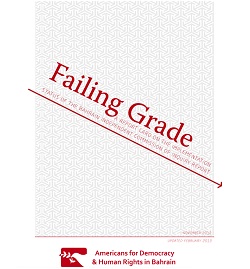ADHRB released a publication today that provides an assessment of the current status of implementation of recommendations made by the Bahrain Independent Commission of Inquiry (BICI). The publication, titled “Failing Grade: A Report Card on the Implementation Status of the Bahrain Independent Commission of Inquiry Report,” offers a thorough analysis of the implementation status of each of the 26 BICI recommendations. According to ADHRB’s findings, only one of the 26 recommendations has been fully implemented. ADHRB’s publications come on the eve of the one-year anniversary of the BICI report, which was issued on November 23, 2011.
The BICI was established by the Government of Bahrain in 2011 to identify the causes of the protests that broke out early last year, and to recommend reforms to address serious human rights concerns in Bahrain. In its report, the BICI made 26 core recommendations to the Government of Bahrain regarding steps that would need to be taken in order to ensure that a recurrence of events did not occur. Among them were recommendations that officials be held accountable for torture and cruel, inhuman, or degrading treatment; that victims of torture, ill-treatment, and prolonged detention be compensated; that censorship be relaxed; and that a national reconciliation program be developed to address grievances held by politically, socially, and economically disenfranchised segments of Bahrain’s population.
Despite promises by Bahrain’s king and other leaders that the BICI recommendations would be swiftly implemented, very little has changed in the past year. No high-level officials have been charged for the torture and abuse of detainees; the victim compensation program makes it very difficult for people to successfully file a claim; freedom of speech and expression continues to be denied, as demonstrated by recent arrests of Bahrainis who allegedly made disparaging remarks about the king on Twitter; and national reconciliation appears to be as unlikely now as it did a year ago. The publications released today demonstrate just how slow reforms have been in Bahrain.





